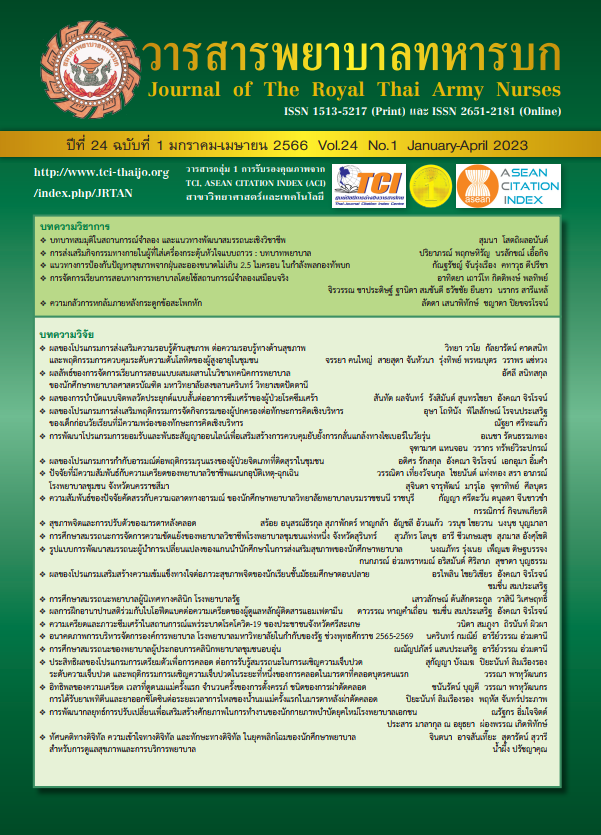Predicting Factors on Domestic Elder Abuse
Keywords:
domestic elder abuse, factors predicting, social supportAbstract
The objective of this study was to investigate predicting factors of domestic elder abuse: perpetrators’ behaviors, elders’ behaviors, social support, and domestic elder abuse, and to examine the predictive ability of these factors to domestic elder abuse. The sample was 253 elders obtained from convenience sampling and came to receive services at the Tertiary Hospital in Bangkok. Data were collected via interview using demographic questionnaires, Family Member at Risk Abuse Questionnaire, Elder’s Behavior Assessment, and Social Support Appraisal. Data analyses used were descriptive statistics, Chi-square, and univariable and multivariable logistic regression. The findings showed that most elders who had been abused were female (57.3%) including psychological abuse (63.6%), neglect (59.7%), exploitation (57.7%), violation of rights (54.2%), and physical abuse (9.5%). Factors predicting domestic elder abuse included: family members with psychological problems, being dependent on elders, elder’s behaviors and social support. These factors could predict 58.5% of domestic elder abuse. (R2 = 0.585, p<.05).
This study suggests that nurses should care for families with members having psychological problems, being dependent on elders, having low social support and elders’ behaviors. Further study should be conducted to develop a program and to improve the environment to reduce domestic abuse situations.
Downloads
References
Yon Y, Mikton CR, Gassoumis ZD, Wilber K. Elder abuse prevalence in community setting: a systematic review and meta-analysis. The Lancet Global Health. 2017;5(2):147-56.
Chompunud ML.S, Charoenyooth C, Palmer MH, Pongthavornkamol K, Vorapongsathorn T, Jitapunkul S. Prevalence, associated factors and predictors of elder abuse in Thailand. Pacific Rim International Journal of Nursing Research. 2010;14(4):283-96.
Pradabmuk-Sherer P, Wongyai N, Charoensukploypol B. Social Protection Network: Social Immunity for the Elderly (Research Report). Bangkok: Faculty of Social Sciences and Humanities, Mahidol University; 2014 Oct. (in Thai)
Wathasit W, Siri S, Narksawat K, Sujirarat D, Jirapongsuwan A. Prevalence of Family Violence against Female Elderly and Characteristic of Perpetrator in Nakhon Ratchasima Province. In: The 34th National Postgraduate Research Conference Presentation Project. 2558;1-9. (in Thai)
Labrum T, Solomon PL. Elder Mistreatment Perpetrators with Substance Abuse and/or Mental Health Conditions: Results from the National Elder Mistreatment Study. Psychiatry Journal. 2018;89:117-28.
Chaokoh T, Chumchon W. Abandoning the Elderly in Samut Songkhram Province (dissertation). Bangkok: Chombueng Rajabhat University; 2013. (in Thai)
Amstadter AB, Zajac K, Strachan M, Hernandez MA, Kilpatrick DG, Acierno R. Prevalence and correlates of elder mistreatment in South Carolina: The south Carolina elder mistreatment study. Journal of Interpersonal Violence 2011;26:2947-72.
John EG. Epidemiology in modern perspective. Proceedings of the Royal Society of Medicine 1954;47(7):564-70.
Griffiths J, Putnoi S, Pongsaksri M. The general practitioner assessment of cognition; GPCOG (Thai Version): validity and reliability. Paper presented at the Rewinding the Aging Clock, Hong Kong; 2013. (in Thai)
Chompunud Somjinda. Diagnostic criteria and associated with Thai elder abuse by family members (thesis). Bangkok: Mahidol University; 2007. (in Thai)
Mangkiatsakul Aree. Social support and adaptation in adolescents with cancer (thesis). Bangkok: Mahidol University; 2000. (in Thai)
Chintanawat, Rojanee. Prevalence and risk factors for abuse among Thai older adults in Chiang Mai (thesis). Bangkok: Mahidol University; 2003. (in Thai)
Jintanawat R, Sukhamwang K, Panuthai S. Prevalence and Risk Factors of Assault in Elderly Thai Women. Journal of the Nursing Council 2006;21(3):31-46. (in Thai)
Ferguson D, Beck C. H.A.L.F.: A tool to assess elder abuse within the family. Geriatric Nursing 1983;4(5):301-4.
Yadav UN, Paudel G. Prevalence and associated factors of elder mistreatment: a cross sectional study from urban Nepal. Age and Ageing 2016;45:609-14.
Gil APM, Kislaya I, Santos AJ, Nunes B, Nicolau R, Fernandes AA. Elder abuse in Portugal: findings from the first national prevalence study Journal of Elder Abuse & Neglect. 2015;27(3):174-95.
Dong XQ. Elder abuse: Systematic review and implications for practice. Journal of the American Geriatrics Society 2015;63:1214-38.
Ribot VC, Rousseaux E, García TC, Arteaga E, Ramos ME, Alfonso M. Psychological the most common elder abuse in a Havana neighborhood. MEDICC Review 2015;17(2): 39-43.
Bows Hannah. Sexual Violence Against Older People:A Review of the Empirical Literature TRAUMA, VIOLENCE, & ABUSE 2018;19(5): 567-83.
Ketpichayawatana J Wiwatvanich S. Elderly Mistreatment among Thai Elderly:The Review State of Science and Current Situation. (Research Report). Bangkok: Chulalongkorn University; 2009. (in Thai)
Harford TC, Chen CM, Kerridg, BT, Grant BF. Self-and other-directed forms of violence and their relationship with lifetime DSM-5 psychiatric disorders: Results from the National Epidemiologic Survey on Alcohol Related Conditions-III (NESARC-III). Psychiatry Rescarch 2018;262:384-92.
Sinchaiwanichakul C, Kespichayawattana J, Factors Related to Healthy Aging Among The Older Persons in Community-Dwelling of Bangkok Metropolitan. Journal of The Royal Thai Army Nurses. 2018;19(special issue): 100-8. (in Thai)
O’Connor D, Kelson E. Boomer Matters: Responding to Emotional Health Needs in an Aging Society. Journal of Gerontological Social Work. 2018; 61(1):61-77.
Downloads
Published
How to Cite
Issue
Section
License
Copyright (c) 2023 Journal of The Royal Thai Army Nurses

This work is licensed under a Creative Commons Attribution-NonCommercial-NoDerivatives 4.0 International License.
บทความหรือข้อคิดเห็นใดใดที่ปรากฏในวารสารพยาบาลทหารบกเป็นวรรณกรรมของผู้เขียน ซึ่งบรรณาธิการหรือสมาคมพยาบาลทหารบก ไม่จำเป็นต้องเห็นด้วย
บทความที่ได้รับการตีพิมพ์เป็นลิขสิทธิ์ของวารสารพยาบาลทหารบก
The ideas and opinions expressed in the Journal of The Royal Thai Army Nurses are those of the authors and not necessarily those
of the editor or Royal Thai Army Nurses Association.






